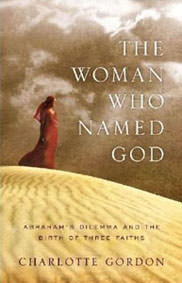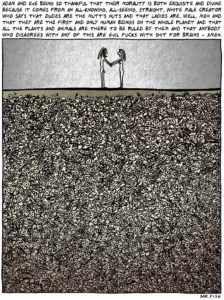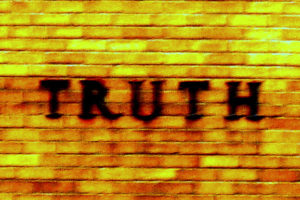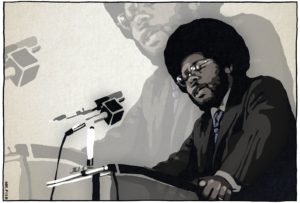Jonathan Kirsch on ‘The Woman Who Named God’
Is the biblical tale of Hagar “a creation story as important as the Garden of Eden,” as Charlotte Gordon argues in her provocative new book?Is the biblical tale of Hagar “a creation story as important as the Garden of Eden,” as this new book argues?
Here and there on the front lines of the clash of civilizations, we can glimpse a few pockets of compassion. One example is the revisionist reading of a neglected passage of Genesis that depicts the tragic fate of an Egyptian slave named Hagar, the mother of Abraham’s first son and, by tradition, the matriarch of the Arab nation. Modern commentators have rescued Hagar from obscurity and reinvented her as a feminist icon and a symbol of reconciliation among the three religions that claim Abraham as a founder.
According to the Bible, Abraham (still called Abram at this point in the biblical narrative) is sent into Hagar’s bed by his own wife, Sarah (still called Sarai), because she is incapable of giving him children. But when the fecund young woman gives birth to a son, Ishmael, Sarah turns suddenly jealous and vengeful. And when God later bestows a child on Sarah in advanced old age, Sarah urges Abraham to send Hagar and Ishmael into the desert to die—a demand that God is shown to endorse. Yet God ultimately spares the victims of Sarah’s wrath: “Arise, lift up the lad, and hold him in thine hand,” God tells Hagar in the wilderness, “for I will make him a great nation” (Genesis 21:18).
Poet and biographer Charlotte Gordon, author of “The Woman Who Named God,” insists that the story of Hagar is “a creation story as important as the Garden of Eden,” if also “one of the most frequently misinterpreted of all western stories.” She concedes that it is the starting point of the historical enmity between Jews, Christians and Muslims, but she also implores her readers to ask one of those “what-if” questions that reframe all of our conventional wisdom: “What if Abraham had chased after his mistress and firstborn son, begged Sarah to forgive his betrayal, and urged Hagar to forgive Sarah’s jealousy, so that they might raise their sons together? Would we be any better at living in peace?”
The Woman Who Named God: Abraham’s Dilemma and the Birth of Three Faiths
By Charlotte Gordon
Little, Brown and Company, 400 pages
Gordon’s provocative question hints at a more intimate aspect of the story of Hagar. She sees it as a wedge that allows us to crack open the politics of human relationships, “the problem of fidelity not only in marriage but also in relation to God.” Unlike Bruce Feiler (“Abraham: A Journey to the Heart of Three Faiths”), she does not ask us to assume that any of these characters are based on flesh-and-blood human beings. Rather, she declares herself to be a “literary interpreter” and confines herself to what we can learn by deconstructing the biblical text and comparing it to the facts on the ground as revealed by historical scholarship and the unfolding of history itself.
Her sources range from Joseph Campbell to Jack Miles, from Mark Twain to William James, from the erotic poetry of the ancient Canaanites to the “Vision Quest” of the Lakota, all in an earnest effort to place the biblical text in a context that includes other moral, philosophical and religious artifacts. But she mostly draws on Jewish, Christian and Islamic exegesis to point out the tendentious meanings that pious readers have extracted from the text over the last 20 centuries and to show why they have created such tensions among the Abrahamic religions.
Thus, for example, Gordon points out that Abraham is shown to dine with an obscure king named Melchizedek in the Hebrew Bible, but the Christian Bible suggests that Melchizedek was actually a mystical precursor of Jesus, thus reducing Abraham to “a primitive example of what is to come in the New Testament.” Gordon cites an Islamic hadith in which Hagar is shown to refer to the God of the Hebrew patriarchs as Allah, and the author points out that “the Muslim portrayal of Hagar is of a woman who is in many ways Abraham’s equal.”
Gordon joins other revisionist readers of the Bible in elevating Hagar to a lofty status that is denied to her in both the Scriptures and the exegetical traditions of Judaism and Christianity (if not Islam). “She began her life as a slave and ended it as a free woman who gave rise to a proud nation,” writes Gordon. “Hagar’s partnership with God took her far, but so did her initiative.”
Perhaps the single best example of how Gordon rereads and reinterprets the biblical text is the one that inspired the title of Gordon’s book. According to the Bible, after God encounters Hagar and Ishmar in the wilderness and reveals the nation-building role he has assigned to Ishmael, Hagar is shown to address God using a name that she has apparently coined at that moment: “You are El-roi,” says Hagar to Yahweh. “Thus Hagar reveals an originality, a willingness to break from convention, and an eagerness to connect this bewildering deity that sets her apart from every other Biblical figure, male or female,” writes Gordon. “Clearly, rules did not matter to this servant woman.”
The Bible, it has been said, is the least-read best-seller of all times. But there is a whole literature devoted to reconsidering the ancient text, a literature that is full of shocks and surprises, wholly unexpected cross-wirings of religious traditions, and illuminating flashes of insight and wisdom. On that shelf you will find Gordon’s book, a superb example of how to approach the Bible as a work of human authorship rather than the revealed word of God.
|
Jonathan Kirsch is the author of seven books on the history of religion, including, most recently, “The Grand Inquisitor’s Manual: A History of Terror in the Name of God” (HarperOne). |
Independent journalism is under threat and overshadowed by heavily funded mainstream media.
You can help level the playing field. Become a member.
Your tax-deductible contribution keeps us digging beneath the headlines to give you thought-provoking, investigative reporting and analysis that unearths what's really happening- without compromise.
Give today to support our courageous, independent journalists.







You need to be a supporter to comment.
There are currently no responses to this article.
Be the first to respond.